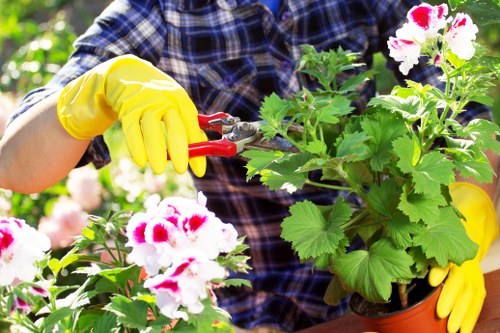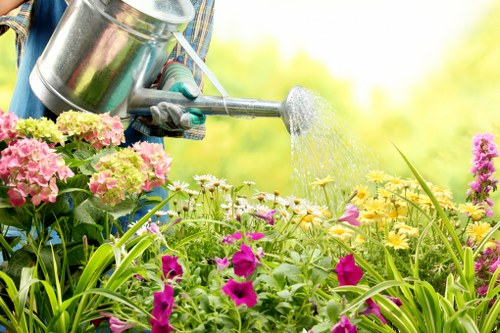Effective Oil Stain Removal for Driveways in St Jamess

Dealing with oil stains on your driveway can be a frustrating experience. Whether you're a homeowner in St Jamess or a local business owner, maintaining a clean and presentable driveway is essential for both aesthetics and safety. Oil stains not only mar the appearance of your driveway but can also lead to more significant issues if not addressed promptly.
Understanding the best methods for oil stain removal is crucial. In St Jamess, where weather conditions can vary, having reliable techniques can make all the difference. This article explores effective strategies to eliminate oil stains from driveways, ensuring your property remains spotless and inviting.
Before diving into removal techniques, it's important to identify the type of driveway you have. Different surfaces, such as concrete, asphalt, or pavers, may require specific approaches to effectively remove oil stains without causing damage.

Identifying the Type of Driveway Surface
Knowing your driveway surface is the first step in choosing the right oil stain removal method. Each material has its own characteristics and requires tailored care to ensure the stain is removed without harming the surface.
Concrete Driveways
Concrete is a popular choice for driveways due to its durability and low maintenance. However, oil stains on concrete can be particularly stubborn, requiring specific cleaning agents and techniques to lift the stain effectively.
Using acidic cleaners or specialized concrete cleaners can help break down the oil, making it easier to scrub away. It's essential to follow the manufacturer's instructions to avoid damaging the concrete surface.

Asphalt Driveways
Asphalt driveways are known for their resilience and flexibility. Oil stains on asphalt can be treated using mild detergents and warm water. For tougher stains, a commercial asphalt cleaner may be necessary.
Regular maintenance and prompt stain treatment can prolong the lifespan of your asphalt driveway, keeping it looking fresh and clean.
Paver Driveways
Paver driveways offer a versatile and attractive option for many homeowners. Oil stains on pavers can be more challenging to remove due to the gaps between stones where oil can seep in.
Using a mixture of baking soda and water, or a specialized paver cleaner, can help lift the oil from the surface and the gaps. Pressure washing can also be effective but should be done carefully to avoid displacing the pavers.

Step-by-Step Oil Stain Removal Process
Removing oil stains from your driveway doesn't have to be a daunting task. Follow these simple steps to effectively eliminate oil stains and restore the appearance of your driveway.
1. Absorb Excess Oil
Start by blotting up as much oil as possible using paper towels or an absorbent material like kitty litter. This helps prevent the oil from penetrating deeper into the driveway surface.
- Spread the absorbent material over the stain and let it sit for at least 15 minutes.
- Sweep up the material and dispose of it properly.
2. Apply a Cleaning Solution
Choose an appropriate cleaning solution based on your driveway's material. For concrete, a mixture of trisodium phosphate (TSP) and water works well, while mild detergents are suitable for asphalt driveways.
Generously apply the cleaner to the stained area, ensuring complete coverage. Allow the solution to sit for about 10-15 minutes to penetrate the oil.

3. Scrub the Stain
Using a stiff-bristled brush, scrub the stained area in a circular motion. This helps lift the oil from the driveway surface.
For stubborn stains, you may need to repeat the application and scrubbing process several times to fully remove the oil.
- Always scrub gently to avoid damaging the driveway material.
- Rinse the area thoroughly with water after scrubbing.
4. Rinse and Dry
After scrubbing, rinse the driveway with clean water to remove any remaining cleaning solution and loosened oil. Allow the area to dry completely.
For best results, consider using a pressure washer to ensure a thorough rinse, especially for paver driveways where oil can hide in the gaps.
Preventative Measures to Avoid Future Stains
Prevention is always better than cure. Implementing a few simple strategies can help you avoid oil stains on your driveway in the future.
1. Use Mats and Trays
Place mats or trays under vehicles that are prone to leaking oil or other fluids. This simple step can catch drips before they hit your driveway surface.
- Choose mats made from absorbent materials for maximum effectiveness.
- Regularly check and replace mats as needed.
2. Regular Maintenance
Conduct regular inspections of your driveway to identify and address spills promptly. Early intervention can prevent oil from setting into the surface.
Keep your driveway clean by sweeping away debris and removing any potential sources of staining substances.
3. Seal Your Driveway
Applying a sealant to your driveway can create a protective barrier against oil and other stains. Sealants also enhance the appearance of your driveway and extend its lifespan.
- Choose a sealant compatible with your driveway material.
- Apply the sealant according to the manufacturer's instructions, typically in the spring or fall.
4. Manage Traffic
Limit heavy vehicle traffic on your driveway to reduce the risk of oil leaks and associated stains. Encourage visitors to park carefully to prevent accidental spills.
Eco-Friendly Oil Stain Removal Solutions
For those who prefer environmentally friendly options, there are several eco-friendly methods to remove oil stains without harming the environment.
Baking Soda and Vinegar
Baking soda is a natural absorbent that can help lift oil from your driveway. When combined with vinegar, it creates a powerful cleaning solution.
- Sprinkle baking soda over the stain and let it sit for 30 minutes.
- Pour vinegar over the baking soda and let the mixture fizz for a few minutes.
- Scrub the area with a brush and rinse with water.
Biodegradable Cleaners
There are several biodegradable cleaners available that are effective in removing oil stains while being safe for the environment.
Look for products labeled as eco-friendly or biodegradable, and follow the application instructions carefully.
Enzymatic Cleaners
Enzymatic cleaners use natural enzymes to break down oil molecules, making them easier to remove from driveway surfaces.
- Apply the enzymatic cleaner to the stained area.
- Allow it to sit for the recommended time to penetrate the oil.
- Scrub and rinse the area thoroughly.
Professional Oil Stain Removal Services in St Jamess
While DIY methods can be effective, sometimes professional assistance is necessary, especially for large or stubborn stains.
Benefits of Hiring Professionals
- Expertise: Professionals have the knowledge and experience to handle various types of stains and driveway materials.
- Equipment: Access to specialized equipment like industrial pressure washers and commercial-grade cleaners ensures thorough stain removal.
- Time-Saving: Hiring professionals can save you time and effort, allowing you to focus on other important tasks.
Choosing the Right Service
When selecting a professional oil stain removal service in St Jamess, consider the following factors:
- Experience and Reputation: Look for companies with a proven track record and positive customer reviews.
- Services Offered: Ensure the company offers the specific services you need, such as sealing or eco-friendly cleaning options.
- Pricing: Compare quotes from multiple providers to find a service that fits your budget.
Top Local Providers
St Jamess boasts several reputable oil stain removal services. These companies are known for their efficiency, reliability, and commitment to customer satisfaction.
Cost of Oil Stain Removal in St Jamess
The cost of oil stain removal varies depending on the size of the stain, the driveway material, and whether you choose to DIY or hire professionals.
DIY Costs
DIY methods are generally more affordable, with costs primarily associated with purchasing cleaning supplies.
- Cleaning Solutions: $10 - $30
- Baking Soda and Vinegar: $5 - $15
- Brushes and Tools: $10 - $25
Professional Services
Professional oil stain removal services typically charge based on the extent of the staining and the services required.
- Basic Stain Removal: $50 - $150
- Deep Cleaning and Sealing: $150 - $300
- Large or Multiple Stains: Pricing varies
Cost-Effective Tips
To manage costs, consider tackling smaller stains yourself and reserving professional services for more difficult cases. Regular maintenance can also prevent the need for extensive stain removal, saving you money in the long run.
Maintaining a Clean Driveway After Stain Removal
Once you've successfully removed oil stains, maintaining a clean driveway is essential to prevent future stains and preserve its appearance.
Regular Cleaning
Sweep your driveway regularly to remove dirt, debris, and potential staining agents. This simple practice can help keep your driveway looking pristine.
- Use a sturdy broom for sweeping concrete and asphalt driveways.
- Consider using a leaf blower for paver driveways to get into the gaps.
Seal Your Driveway
As mentioned earlier, sealing provides a protective barrier against stains and weather elements. Reapply sealant as needed to maintain its effectiveness.
Address Spills Promptly
Act quickly if you notice any spills or leaks. The faster you address them, the easier they are to remove before they set into the driveway surface.
Environmental Considerations in Oil Stain Removal
When removing oil stains, it's important to consider the environmental impact of the methods and products used. Opting for eco-friendly solutions ensures that you're not only preserving your driveway but also protecting the surrounding ecosystem.
Proper Disposal of Waste
Dispose of oil-soaked materials responsibly. Avoid simply throwing them in the trash, as oil can contaminate landfills.
- Check with local waste management services for proper disposal guidelines.
- Use designated recycling centers for oil-soaked materials.
Using Non-Toxic Cleaners
Choose non-toxic, biodegradable cleaners that break down naturally without leaving harmful residues. These products are safer for both your health and the environment.
Water Conservation
Be mindful of water usage when rinsing out cleaning solutions. Use a bucket of water instead of a running hose whenever possible to reduce water waste.
Preventing Soil Contamination
Ensure that cleaning solutions do not seep into the soil or groundwater. Use absorbent materials and contain spills to minimize environmental impact.
Local Regulations and Guidelines in St Jamess
Before undertaking oil stain removal, familiarize yourself with any local regulations or guidelines in St Jamess. Compliance ensures that your cleaning efforts are lawful and environmentally responsible.
Permits and Restrictions
Some areas may require permits for certain types of cleaning activities, especially if using commercial-grade equipment or chemicals. Check with the St Jamess municipal office for specific requirements.
Disposal Regulations
Adhere to local disposal regulations when handling oil-soaked materials and cleaning solutions. Improper disposal can lead to fines and environmental harm.
Water Usage Rules
Be aware of any restrictions on water usage, particularly during drought conditions. Opt for water-efficient cleaning methods to stay within legal limits.
Enhancing Curb Appeal with a Clean Driveway
A clean driveway significantly enhances the overall curb appeal of your property. By effectively removing oil stains, you can make a positive impression on visitors and potential buyers.
Boosting Property Value
Maintaining a spotless driveway can increase your property's market value. A well-kept driveway suggests that the entire property is well-maintained.
First Impressions Matter
Your driveway is often the first part of your property that visitors notice. Keeping it clean and free of stains creates a welcoming atmosphere.
Complementing Landscaping
A clean driveway complements your landscaping efforts, creating a harmonious and attractive exterior for your home or business.
Choosing the Right Products for Oil Stain Removal
Selecting the appropriate products is essential for effective oil stain removal without damaging your driveway. Here are some top choices for different driveway materials.
Concrete Cleaners
For concrete driveways, products containing trisodium phosphate (TSP) are highly effective. They break down oil molecules, making them easier to scrub away.
- Light 'n Easy Concrete Cleaner
- Klean-Strip Concrete Floor Cleaner
- Krud Kutter Concrete Cleaner
Asphalt Cleaners
Asphalt driveways respond well to mild detergents and commercial-grade asphalt cleaners that remove oil without compromising the surface.
Paver Cleaners
For paver driveways, use specialized paver cleaners or a mixture of baking soda and water. Enzymatic cleaners are also effective for deep cleaning.
Eco-Friendly Options
If you prefer environmentally friendly products, consider eco-friendly concrete cleaners, biodegradable detergents, and natural absorbents like baking soda.
Tools and Equipment for Oil Stain Removal
Having the right tools and equipment can make the oil stain removal process more efficient and effective.
Essential Tools
- Stiff-Bristled Brush: Ideal for scrubbing stains without damaging the driveway.
- Pressure Washer: Provides a powerful rinse, especially for deep or multiple stains.
- Absorbent Materials: Kitty litter, baking soda, or commercial absorbents to soak up excess oil.
- Protective Gear: Gloves and safety goggles to protect yourself from cleaning chemicals.
Optional Equipment
Depending on the extent of the staining, you might consider additional equipment like a steam cleaner for deep cleaning or a blower for paver driveways.
Maintenance of Tools
Regularly clean and maintain your tools to ensure they remain effective for future cleaning tasks. Proper storage preserves their condition and extends their lifespan.
Community Resources in St Jamess for Driveway Maintenance
St Jamess offers various resources to help residents maintain their driveways effectively. From local suppliers to community workshops, there are plenty of support systems in place.
Local Suppliers
- St Jamess Hardware Store: Offers a wide range of cleaning supplies and tools.
- Green Clean Supplies: Specializes in eco-friendly cleaning products suitable for driveway maintenance.
- Driveway Depot: Provides materials and products specifically for driveway care and sealing.
Community Workshops
Participate in community workshops and seminars focused on home maintenance. These events provide valuable tips and hands-on experience with driveway cleaning techniques.
Online Forums and Groups
Join local online forums or social media groups where residents share their experiences and advice on driveway maintenance. These platforms can be a great source of support and information.
Seasonal Considerations for Oil Stain Removal in St Jamess
Different seasons bring unique challenges and opportunities for driveway maintenance in St Jamess. Understanding these seasonal factors can help you plan your oil stain removal efforts more effectively.
Spring
Spring is an ideal time to clean your driveway after the harsh winter months. Removing oil stains from the previous season can prepare your driveway for the warmer months ahead.
- Thaw and clean any ice-melt residues that may have mixed with oil spills.
- Apply sealants to protect against spring showers.
Summer
The warm weather in summer makes it easier to remove oil stains, as heat can help break down oil more effectively. However, be cautious of using water-intensive methods during drought conditions.
Fall
Prepare your driveway for the coming winter by addressing any lingering oil stains. Clean surfaces are less likely to withstand freeze-thaw cycles without sustaining damage.
Winter
Winter requires special care to prevent oil stains from freezing into the driveway surface. Use absorbent materials immediately to prevent long-term staining.
Innovative Solutions and Technologies
Advancements in cleaning technologies have introduced innovative solutions for oil stain removal. These modern techniques can enhance efficiency and effectiveness in maintaining your driveway.
Robotic Cleaners
Robotic driveway cleaners are emerging as a convenient option for regular maintenance. These devices can automatically detect and clean oil stains, reducing the need for manual effort.
Advanced Sealants
Newer sealants offer better protection against oil and other stains. Some sealants are designed to be more resistant to harsh chemicals and weather conditions, providing long-lasting protection.
Green Technologies
Eco-friendly technologies are on the rise, offering sustainable solutions for driveway maintenance. These include biodegradable cleaners and energy-efficient cleaning equipment.
Smart Sensors
Integrated smart sensors can monitor the condition of your driveway, alerting you to potential stains or damage early. This proactive approach ensures timely intervention and maintenance.
Testimonials and Success Stories from St Jamess Residents
Many residents in St Jamess have successfully removed oil stains from their driveways, sharing their positive experiences and effective strategies.
Real-Life Examples
Homeowners have reported significant improvements in their driveway's appearance after using both DIY methods and professional services. These success stories highlight the effectiveness of various oil stain removal techniques.
Lessons Learned
Common lessons from these testimonials include the importance of acting quickly, choosing the right products, and maintaining regular driveway care routines.
Community Impact
A clean and well-maintained driveway contributes to the overall beauty and value of the St Jamess community, fostering a sense of pride among residents.
Conclusion
Oil stains on driveways can be a nuisance, but with the right knowledge and tools, they can be effectively removed. Whether you choose to tackle the stains yourself or seek professional help, maintaining a clean driveway enhances your property's appeal and longevity.
In St Jamess, residents have access to a variety of resources and services to support their driveway maintenance efforts. By implementing the strategies outlined in this article, you can ensure that your driveway remains spotless and inviting year-round.
Frequently Asked Questions
1. How quickly should I treat an oil stain on my driveway?
It's best to treat oil stains as soon as possible to prevent them from setting into the driveway surface. Immediate action makes removal easier and more effective.
2. Can I use household cleaners to remove oil stains?
Yes, certain household cleaners like baking soda, vinegar, and mild detergents can effectively remove oil stains. However, ensure they are suitable for your driveway material to avoid damage.
3. Is pressure washing safe for all types of driveways?
Pressure washing is generally safe for concrete and asphalt driveways. However, for paver driveways, use a lower pressure setting to prevent displacing the pavers or causing damage.
4. How often should I seal my driveway to prevent oil stains?
It's recommended to seal your driveway every 2-3 years to maintain protection against oil stains and other potential damages. Factors like weather conditions and driveway usage can influence the frequency.
5. Are there eco-friendly oil stain removal options available?
Yes, there are several eco-friendly options such as baking soda and vinegar mixtures, biodegradable cleaners, and enzymatic cleaners that effectively remove oil stains without harming the environment.


